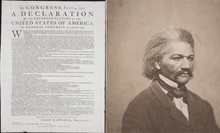Visit the Beinecke Library website for daily hours and other visitor information.
The Beinecke Library marks the 247th anniversary of the nation’s founding with a special display of vital documents of United States history from Yale Library special collections.
All are welcome to visit and see one of the 26 known copies of the historic first printing of the Declaration of Independence. Often referred to as the Dunlap Broadside in honor of John Dunlap who printed approximately 200 copies in Philadelphia on July 4, 1776, the broadside was soon distributed throughout the thirteen states to announce the establishment of the new nation.
The Dunlap Broadside will be on view in a temporary exhibition case on the library’s mezzanine from Thursday, June 22, through Sunday, July 30 (extended dates). Located at 121 Wall Street, the library’s exhibition hall is free and open to the public daily. See the Hours and other details page on this website for more information on daily hours and on current public health protocols. Please note: the library is closed on Monday, June 19, in observance of Juneteenth and on Monday, July 4, in observance of Independence Day.
Visitors are also welcome to view reproductions of the Declaration of Independence and other documents on the north side ground floor windows of the library (toward Grove Street). This window display can be viewed 24 hours a day.
In addition to the first printing of the Declaration of Independence, the library will also have on display some other essential documents of U.S. history:
* Life of William Grimes, the runaway slave, written by himself, first printing, New York, 1825, and second printing, New Haven, 1855, the nation’s first book-length narrative by a person who escaped from slavery.
* Report of the Woman’s Rights Convention, Held at Seneca Falls, N.Y., July 19th and 20th, 1848. Rochester: Printed by John Dick at the North Star Office (i.e., Frederick Douglass’s newspaper office). The Report will be open to the first words of the convention’s “Declaration of Sentiments,” which declares, “We hold these truths to be self-evident; that all men and women are created equal … “
* Frederick Douglass’s Oration, delivered in Corinthian Hall, Rochester, July 5, 1852, published by request, Rochester: Printed by Lee, Mann & Co., 1852. The oration is now remembered as “What to the Slave is the Fourth of July?”
* Carte-de-visite images of Douglass from 1860 and 1865; and of Lucretia Mott, abolitionist, women’s rights activist, and an organizer of the 1848 convention, from 1870.
